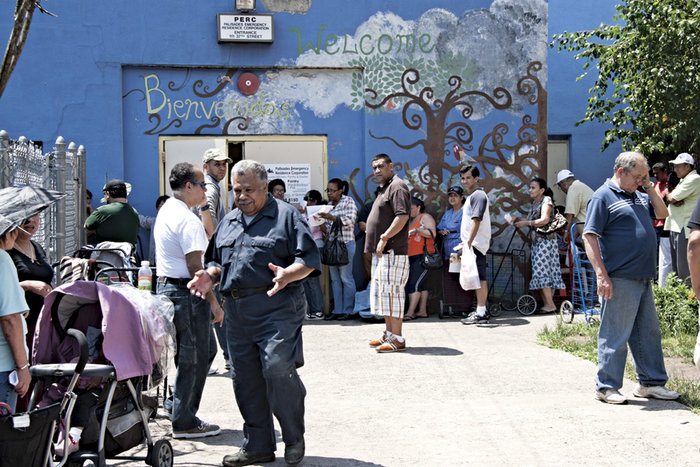September is Hunger Awareness Month, though Hudson County needs no reminder. Union City’s Palisades Emergency Residence Corporation (PERC) soup kitchen, food pantry, and 40-bed shelter on 37th Street came to the aid of record-breaking numbers of guests this past year, according to Executive Director Emory Edwards.
The shelter first broke a record in January, but last month, typically slower like most summer months, they smashed that record.
Their food pantry served 1,307 people in August, many more than the 922 people in January.
PERC’s Overflow Center, which houses guests in the center’s cafeteria when their overnight shelter is full – which it always is, just like every shelter in Hudson County, Edwards said – housed 283 people in January and 348 in August.
“We have been unbelievably busy all summer,” Edwards said, “So we’re a little on edge about what the winter is going to look like. If it’s this busy now, what are we going to do in January and February?”
Unfortunately, just when PERC’s needs are at an all-time high, government funding and the ability of those in the community to help meet those needs are decreasing.
Last year the shelter lost $100,000 in funding, which forced them to restructure and concentrate all they have on what Head Chef Steve Baker calls “the front lines.” Edwards’ is the last remaining paid administrative position, and Baker chuckled a bit when he listed his title as head chef because, he said, he is actually the only chef.
“If it’s this busy now, what are we going to do in January and February?” – Emory Edwards
____________
“We have become the ultimate multitasking operation,” Baker said. “You put your foot in and go for what you know our clients need. They have enough problems as it is once they get to us, so we try our best to not add to it. Our job is to keep the hope alive, and we do what it takes.”
The danger in the myth
Edwards recalled one guest who, in her first week at the shelter, found herself in shock as she realized where her life had taken her.
“She couldn’t believe she was here,” he said. “She woke up and said, ‘What happened?’ After the second week, she realized that everyone here has a story that defies the usual stereotype of what someone in a shelter is like. The hope starts to come back and we keep people focused on what can be rather than what was.”
Baker described his encounter with a middle-aged Caucasian mother who had been laid off from the job that supported her family. She managed to wrangle a summer job at Target typically taken by teenagers, and had to visit the food pantry every two weeks. But it was not enough.
She had to get a second job to make ends meet with the intention of weaning off the food pantry, but then she faced the expense of child care, which made that impossible.
“Cost of living is increasing and wages are decreasing. People are moving out of the city because they can’t afford rent, and the net effect of richer people moving into the area boosts budgets, but makes it unaffordable for people who live here,” Edwards explained. “People should come by at six and see who’s eating, or on Wednesday afternoons and see who’s at the pantry for food, because I know they’d be surprised.”
Combating paucity with creativity
“Congressional funding for people who are poor and working class has been declining fairly precipitously,” Edwards explained. “In fact, it fell off a cliff this year, but we are holding our own and learning to do more with less.”
A tasty example of this was the day Baker found himself with no sugar in his supplies. But he did have five cases of root beer someone had donated, and a batch of Swiss Chard from a nearby farmer’s market’s leftover store. Baker made a cake out of it.
Clients were thrilled, and Edwards found a new favorite dessert.
“Planning for the week is impossible here,” Baker said. “We try to keep things on reserve, but our entire reserve allocation went out the window this weekend. So we get creative, and we get a nutritional meal out no matter what it takes.”
Hope in the face of desperation
What it takes to run PERC, both men emphasized, is the generosity of the community, even though the community is less and less able to donate. They have 200 volunteers to help run the operation, and local churches, farmers’ markets, and neighboring organizations do whatever they can to make sure that people who show up hungry do not leave that way.
Those who tend to give the most are those who have been there or those who work most closely with people in emergency situations, Edwards said.
Like their former client who sends PERC three jars of peanut butter through Amazon.com each month. Or the clients who take from the food pantry, but only after volunteering to set it up on Wednesdays.
“Some days you’re at your desk in front of a mountain and all you can see is the face of the people who help and are helped,” Edwards said. “I open envelopes with five dollar checks and that’s a gratitude moment. It’s a job of gratitude, and it gets you through the day.”
PERC’s shelter, soup kitchen, and pantry are located at 111 37th St. in Union City.
PERC will hold its annual fundraiser on Oct. 23 at Antonia’s by the Park located at 9011 Palisade Ave. in North Bergen from 6 to 9 p.m., with an R.S.V.P. deadline of Oct. 16. For more information on volunteering, donations, or the services PERC offers, call (201) 348-8150, email events@percshelter.org, or visit the website at www.percshelter.org.
Gennarose Pope may be reached at gpope@hudsonreporter.com
